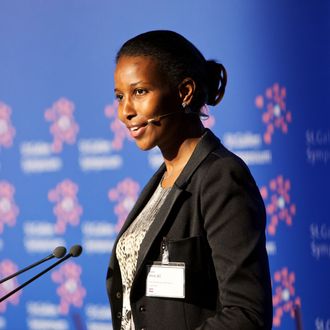
Last week, Brandeis revoked an invitation it had offered to Ayaan Hirsi Ali, the Somali-born feminist and political essayist, to attend the university’s commencement ceremonies, where she had been scheduled to speak and receive an honorary degree. Hirsi Ali has spent much of the last decade denouncing not just Islamist fundamentalism but Islam generally (she has described the religion as a “destructive, nihilistic cult of death”), and once Brandeis’s Muslim Students Association and many others objected to her appearance, the university pretty hastily revoked her invitation. Conservatives have since denounced Brandeis for suppressing free speech, and liberals have, somewhat more tepidly, defended the university’s position that Hirsi Ali’s statements are incompatible with its core values of tolerance and openness and respect for others. Both arguments have some merits. But neither really addressed the more interesting question, which is what Brandeis misunderstood about Hirsi Ali and its own community when it invited her in the first place.
Brandeis must have known what it was getting into. You can’t do five minutes of research on Ayaan Hirsi Ali without noticing a few basic facts: that she is a feminist who had her own genitals mutilated in Somalia when she was a child; that she has, as an adult, become an outspoken and at times furious critic of Islamist fundamentalism’s repression of women in particular and human rights generally; that she had worked closely with Dutch director Theo van Gogh, who was murdered by an Islamic radical in retaliation for his political views; and that her condemnations of the religion have been broad and aroused significant controversy. Her exact inflammatory statements are central to each of the many magazine profiles that have been written about her, to her Wikipedia page, to her Google results. “This makes Muslim students feel very uneasy,” said Joseph Lumbard, Brandeis’s chairman of Islamic and Middle Eastern studies. “They feel unwelcome here.” Of course they did: Hirsi Ali had suggested in a 2007 interview with Reason magazine that “Islam, period” — not its radical or militant form — needed to be “defeated. Once it’s defeated, it can mutate into something peaceful.”
Pressed by the Times, Brandeis said it had not been aware of the strongest of Hirsi Ali’s condemnations of Islam before a Change.org petition circulated protesting her appointment as a commencement speaker. This is just not believable. Somehow, they must not have understood what the reaction would be. Which raises the question, why not?
After the fact, Brandeis issued a statement to explain itself and defend its decision. Honorary degrees, the university said, are “a means of acknowledging outstanding accomplishments. … Just as Brandeis does not inquire into the political opinions and beliefs of faculty or staff before appointing them, or students before offering admission, so too the University does not select honorary degree recipients on the basis of their political beliefs or opinions.”
This is a more or less reasonable position to take if you are talking about, say, chemists. When it comes to political figures, it seems hard to figure out how you could disentangle their political beliefs from their accomplishments; it seems a little absurd to even try.
More revealing is the original statement Brandeis issued (since amended on their official website, but available here) announcing the honorary degree recipients. The biographies it gives of the others are fairly formal, distant affairs (Jill Abramson “was instrumental in the newsroom’s effort to expand to new and varied digital and mobile platforms”). Hirsi Ali’s bio is much more intimate. Brandeis explains that Hirsi Ali once “escaped an arranged marriage”; it mentions that the assassin who killed her collaborator Theo van Gogh “left a death threat for her pinned to van Gogh’s chest.” It asserts that when the Dutch minister for immigration revoked her citizenship, the resulting court case “led to the fall of the government.” These aren’t the terms you use to describe an accomplished individual whose political beliefs you haven’t scrutinized especially closely. These are the terms you use to describe someone whom you believe to be a hero.
Brandeis could, of course, have taken a more cautious step with Hirsi Ali. It could have invited her to speak on campus, and arranged a speaker who represented a different view, for instance, or had her come as part of a panel interrogating the treatment of women in the Islamic world. Hirsi Ali is an important voice, and these are urgent matters: 125 million women have had their genitals mutilated, many of them in Muslim countries, and still more Muslim women have had social emancipation and education denied to them. (Women of other religious traditions have, too, of course, but still, we are talking about a great many Muslim women.) But Brandeis chose to take the much more aggressive step of granting her an honorary degree. These decisions are not taken on a whim. Brandeis must have believed what the honorary degree communicated, that she was carrying forth in the world the humanistic work that was central to the university’s own mission.
I suspect that the real story of the Ayaan Hirsi Ali episode is that our liberal intellectual culture is still not very certain about whom to side with in the arguments over Muslim fundamentalism — no more sure, really, than the U.S. government is about whom to side with in its tactical pursuit of allies in the Islamic world. Brandeis thought it had identified a hero, of a kind, someone whose rhetorical extremism would be understood to be in defense of humanist ends. Instead it found that, in the eyes of many of its members, she was someone animated by simplistic sectarian hate. The villains in the battles over Muslim fundamentalism are easy to identify. The heroes, Brandeis discovered, are much harder to find.





























